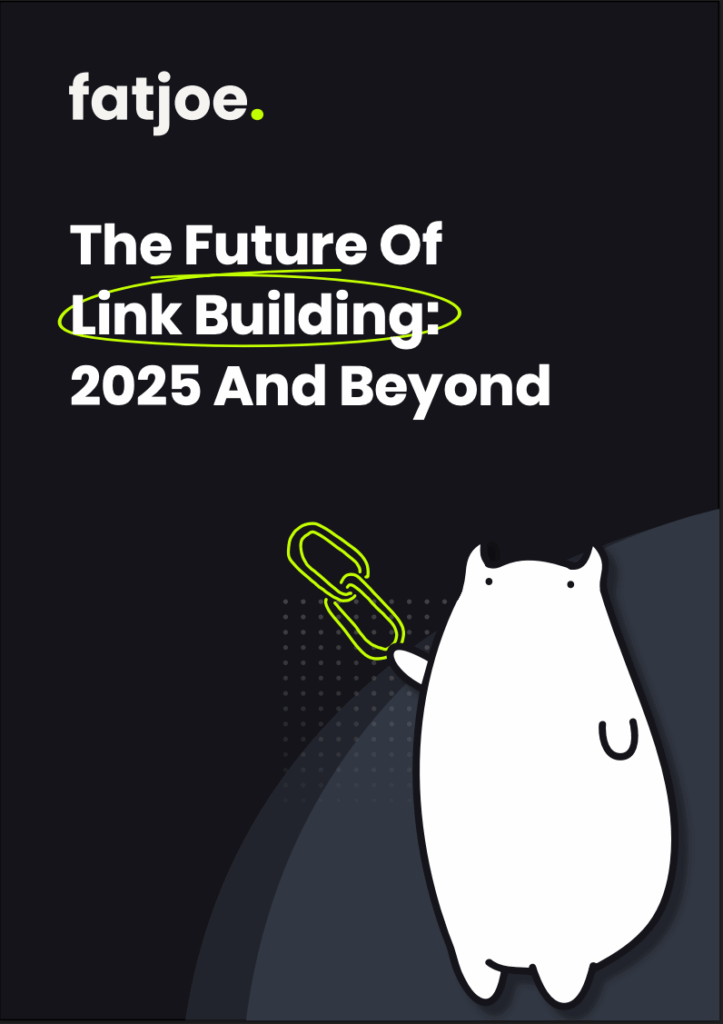The Future Of Link Building: Statistics And Takeaways You Should Know
Daniel Trick
Jul 22, 2025
6 min read
In late 2024 fatjoe conducted a survey of over 500 professional link building SEOs to get a definitive answer to the question: what is the future of link building in 2025 and beyond?
You can read the full The Future Of Link Building: 2025 And Beyond report here, but we’ve broken out key link building statistics and takeaways in this post.
Over the last twenty years, we’ve seen the link building industry balloon from sketchy links on forums to truly global digital PR drives.
But what do the link building statistics say?
Key Link Building Statistics
47% of link builders spend more than £600 on link building per month
fatjoe data shows that the average respondent in our survey was allocating more than £600 of their marketing budget to link building every month, and a further 14% spent over £1,500 per month.
Meanwhile, only 41% spent between £351 and £600, and a mere 13% spent between £250 and £350.
What does this tell us? If you’re not putting money into building links, you’re falling behind!
61% of link builders said their spending on link building would increase in 2025
Most SEOs surveyed believed that their spending on link building would rise in 2025.
Breaking it down, more than half of respondents in the UK and more than 63% in the US expected an increase, while 39% in the UK and 24% in the US thought it would stay the same.
Only a tiny fraction of link builders (4%) thought their spending would decrease in 2025.
64% of link builders thought their SEO budget would rise in 2025
Link building isn’t the only element of SEO seeing increased spending.
More than 64% of respondents thought that their overall SEO budget would increase in 2025.
54% of link builders anticipate having to increase staffing to keep pace with 2025 link building budgets
SEOs at companies of all sizes told us that they are likely to increase staffing in response to increased link building requirements in 2025.
Companies with 10 to 49 employees were most likely to field new workers, followed by those with 50 to 99 employees and 100 to 259 employees.
Only a tiny fraction thought that link building staffing would decrease.
51% of SEOs place content quality and relevance in their top three most important factors in link building
We saw mixed opinions in our survey about the factors that matter most to link building. Content quality and relevance stood out (according to 51% of respondents), followed by brand authority and trust, semantic search and contextual relevance, user engagement, and voice search optimization.
Only 28% said domain authority metrics would take precedence in the future.
Whether other factors, such as authenticity, will matter in the future remains to be seen.
73% of link builders said they would be using digital PR as a link building tactic in 2025
Nearly three-quarters of the SEOs in our survey believed that digital PR was critical to their success in 2025, making it the strongest in the category.
Other top approaches include blogger outreach (guest posting) favored by 68% of respondents, niche edits, favored by 55% of respondents, and press releases, enjoyed by 52%.
Given the power of digital PR and its ability to get brand mentions in top-flight publications, we don’t see it slowing down in 2025. In fact, we think it’ll speed up.
No, it’s not cheap, but wow is it effective.
87% of link builders said digital PR was important for link building in 2025 and beyond
An incredible 87% of our respondents agreed that digital PR would be at least “somewhat” important for link building efforts in 2025 and beyond. We believe this reflects the power of the service and impact it has on overall online visibility.
Digital PR is particularly valuable for brands with real stories behind them.
High-value mentions in media publications can attract new customers with genuine interest in stories about the brand.
89% of link builders believe link relevance is important for link building
Nearly 9 out of 10 respondents now believe that relevance is critical for link building.
Really we’re just shocked that 11% of people didn’t think it mattered that much!
67% of SEOs say organic traffic is the most important metric for evaluating backlink quality
Organic traffic is the number one metric SEOs use to evaluate backlink quality, but only just.
Domain rating came in a close second in our survey at 64% with domain authority just behind it.
Interestingly, Trust Flow lags behind, but was still seen as important by 52% of respondents. However, this metric usually plays second fiddle to Moz’s and Ahrefs’s alternatives.
Only 43% of SEOs said rankings were their primary link building KPI
Ranking was the number one metric SEOs were using, but closely followed by organic traffic, link quality, domain authority, cost per link, and number of backlinks.
This change in emphasis away from focusing purely on keyword ranking might reflect shifting priorities and a move toward quality.
However, we were surprised that so few brands were using the true outcome measure as their KPI of interest.
51% of the most experienced SEO professionals said that ranking was the key metric
This statistic tells us that the most experienced SEOs still value ranking as a KPI for evaluating the quality of their link building efforts.
43% of link builders said that quality control and measuring ROI were their two biggest link building challenges
Our survey revealed that challenges were distributed relatively evenly across the board.
Many respondents told us that spam and negative SEO, relationship-building and content relevance were issues for them in addition to ROI and quality control, but nothing stood out.
The general theme here was that AI was making life more challenging, especially due to its ability to create negative content at low cost.
Key Takeaways
SEOs spending £350 or less declines with experience
More good news for link building: SEOs with the most experience spend more on creating new links. We found that as their time in the industry exceeds 1-3 years, the share of SEOs spending below £350 on these projects falls.
We’d like to think that this is because link building is so valuable. However, it could also come from the fact that more experienced SEOs gain access to larger budgets.
The legal industry is the biggest spender on link building
62% of respondents working with legal sector clients spend more than £601 per month on links – making it the most expensive industry for link building in the survey.
AI will increase spending on links
Overall, the more important respondents think AI is, the more likely they are to spend on links.
Respondents who told us that AI is “very important” were nearly twice as likely to increase link spending compared to those rating it “very unimportant.”
We think this is because of the value of brand mentions when AI generates results for search queries.
Respondents can see the value of these links and how clickable they are for users wanting to find information fast.
Customization and flexibility are the number one reason SEOs were bringing link building in-house
We asked SEOs why they might want to bring more link building tasks in-house in the future, and they told us.
The biggest reason was customization and flexibility, with 41% of respondents citing this as their motivation.
Quality control was another factor for 40% of respondents.
Other reasons included cost efficiency, expertise development, integration with other in-house efforts, faster turn-around, and direct communication.
AI changed everything and nothing according to link builders
Like the SEOs in our survey, we think AI will lower the overall effort involved in link building and help identify link opportunities faster going forward.
This adjustment means that site owners are more likely to be flooded with link building requests, so manual outreach will, ironically, probably be here to stay.
Link builders believe search engines will penalize automated link schemes
With the drive toward higher quality and Google’s E-E-A-T, respondents feel that search engines will penalize automated link building schemes going forward.
Anything that looks spammy or AI-written is likely to see downgrades. Therefore, we always insist on human-written content and manual, natural link placements.
SEOs are still often adding link building as a last-minute afterthought
Getting CEOs on board with link building remains challenging, so many SEOs still tack this service on as a last-minute afterthought.
Many find it difficult to convince executives to include it in their budgets because the results aren’t immediately visible, and it can be challenging to attribute the revenue split.
Many SEOs believe link opportunities are decreasing due to competition
Another common theme is that link building opportunities are declining because the landscape is becoming more competitive.
Many of our respondents told us that link building opportunities were harder to find these days because big brands dominate the most reputable sites, and that the open web was undermining some niche high-quality links.
SEOs told us that humans remain the best link builders
SEOs were also quick to let us know that humans remained the best link builders, despite all the AI automation.
As AI commoditizes information, many brands are seeking real people who can connect to their audiences on an emotional and personal level.
Genuine authenticity is becoming the real currency that matters for outreach.
Some SEOs believe red tape and brand reputation will shape link quality
Finally, tighter regulations in countries like the UK may lead to more regulations in how businesses in the finance, healthcare, tech and legal sectors can build their links.
Authorities or regulatory bodies may request greater scrutiny over link partners and third-party content on their websites.
The Future Of Link Building Is Here
We’ve compiled 22 of our top link building statistics and takeaways here, but there’s more to be found in the full fatjoe The Future Of Link Building: 2025 And Beyond report.
Ultimately our key takeaway is: the more link building the more it stays the same.
The focus may change, brand is now king, metrics come and go – but link builders remains as valuable for SEOs and SEO as it has ever been – maybe even more so.
Become a Pro at SEO
Join 65,000 others and learn the secrets to SEO success with our weekly blog posts.

